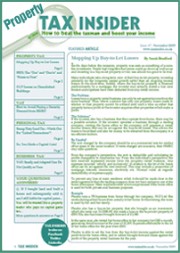Before you go, sign up to our free tax saving email course. Get 7 top property tax saving strategies in your email inbox that will help you save thousands in tax. Unsubscribe any time.
 Mark McLaughlin points out taxpayers may sometimes be able to rely on professional advice as an escape from a penalty for a careless tax return error if that advice turns out to be incorrect. Mark McLaughlin points out taxpayers may sometimes be able to rely on professional advice as an escape from a penalty for a careless tax return error if that advice turns out to be incorrect. Tax is a complicated matter, and tax return errors sometimes arise. Unfortunately, HM Revenue and Customs (HMRC) will generally consider whether to charge a penalty if (for example) the error results in a tax liability being understated. However, it is important to bear in mind that HMRC cannot impose penalties if an error has arisen despite the taxpayer having taken ‘reasonable care’ (FA 2007, Sch 24, para 3(1)(a)). At the time of writing, the penalty legislation is to be changed, so that where a person receives advice in relation to certain tax avoidance arrangements, they cannot rely on that advice to demonstrate that they have taken reasonable care to avoid an inaccuracy arising from their use of the arrangements in certain circumstances. However, this article deals with incorrect advice from an adviser that does not relate to such avoidance arrangements. Incorrect advice If the tax return error is the result of incorrect advice from the taxpayer’s professional adviser, there is liability to a penalty unless the taxpayer satisfies HMRC that they took reasonable care to avoid the error (FA 2007, Sch 24, para 18). Note that the onus is on the taxpayer to satisfy HMRC that reasonable care was taken, by providing evidence to that effect (see HMRC’s Compliance Handbook manual at CH84540). Nevertheless, this represents an important exception from penalties for taxpayers. For example, in Carrasco v Revenue and Customs [2016] UKFTT 731 (TC), the taxpayers (husband and wife) owned a property (ST), which was let to tenants until June 2010. The property was put up for sale, and contracts were exchanged on 25 May 2010. Completion took place on 23 July 2010. The taxpayers moved into ST on 29 June 2010, and resided there until 22 July 2010. On the advice of their accountants at the time, the taxpayers executed a principal private residence election for capital gains tax (CGT) purposes on 23 April 2012, to the effect that ST was their principal private residence until 22 July 2010. By an election signed on the same date, the taxpayers elected another property (FR) as their principal private residence from 30 June 2010. The taxpayers subsequently filed tax returns in which they each declared capital gains on the property disposal as reduced by private residence relief for the last three years of ownership (N.B. relief for the final period of ownership has since been reduced to the last 18 months). Unfortunately, the taxpayer’s advisers apparently overlooked the fact that the date of disposal for CGT purposes was the date when the contracts were exchanged, not the date of completion (TCGA 1992, s 28). Reasonable care? Following an enquiry into the taxpayers’ tax returns, HMRC raised CGT assessments and issued penalty notices for careless errors. The taxpayers appealed against the penalty notices. The First-tier Tribunal accepted that the taxpayers’ tax returns relating to capital gains were based on advice given by their professional adviser. In the tribunal’s judgment, where a person seeks appropriate professional advice from a professed expert, it would almost always be reasonable to rely upon that advice provided that the person selected a seemingly competent professional adviser, unless the person knew of factors that indicated that the advice ought not to be relied upon. The tribunal concluded that the taxpayers took reasonable care to avoid the inaccuracy that resulted in the CGT underpayment by relying on the advice of their professional adviser. The taxpayers’ appeal was allowed. Taxpayers have been found to have taken reasonable care by relying on professionals acting in an advisory capacity in other cases. The tribunal in Carrasco cited one such case (Mariner v HMRC [2013] UKFTT 657) as an ‘accurate and helpful statement of the applicable law’. Taxpayers who relied on incorrect tax advice from professional advisers have been successful in other appeals as well, including Hanson v Revenue and Customs [2012] UKFTT 314 (TC), and more recently Gedir v Revenue and Customs [2016] UKFTT 188 (TC). Practical Tip: However, reliance on professional advice will not constitute reasonable care in every case, including if the advice was obviously wrong and the taxpayer should have known that it was incorrect (Shakoor v Revenue and Customs [2012] UKFTT 532 (TC). The same applies if there was no reasonable basis for the advice, or the advice was based on a simple failure to consider the relevant statutory rules (Stratton v Revenue and Customs [2012] UKFTT 578 (TC). This is a sample article from the monthly Property Tax Insider magazine. Go here to get your first free issue of Property Tax Insider.
|


 Tax Articles
Tax Articles